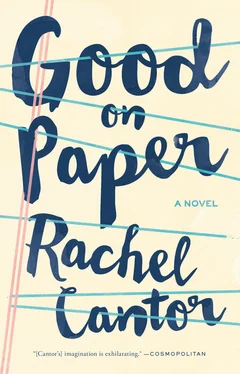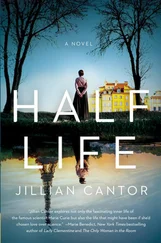And it was here, at St. Vincent’s, that he died.
And over there, south of the Vanguard, my father’s place, where I broke up with T. Where my father and I moved after we returned from Rome without my mother. A new apartment for a new life, he’d said, face grim. Where he was rolled away: I’ve made mistakes , he said. Don’t hate me .
Ahmad thought I was a bad mother? A bad mother ? My father and I waited at the Rome airport. At Kennedy, a light snow falling, we waited some more. I was Andi’s age when my mother left us. Despite the blankets on my New York bed, the sun shining through the window, I was always cold, I felt myself on an ice floe alone, floating farther and farther from the shore. My father saw none of this. Go back to bed, he’d say, slouched dull with grappa. Wrapping his bathrobe tight around his chest. Leave your daddy alone, he said, you need to leave your daddy alone.
Later, I threw things from my bunk, breakable things, dolls with china heads, souvenir ashtrays he brought back from his trips, then tiptoed through the shards, daring my skin to break. Until the neighbors complained about the noise.
It’s nothing, I said, hiding my scarred toes under a blanket. The neighbors are crazy.
Good, my father said, and left the room, fishing in his bathrobe for a pipe.
When I was older, I tested the elasticity of his not-being-there. I stayed away nights: I could always find a boy in Washington Square, a man even, to take me home. When I returned, I found him sleeping, his arm slung over his easy chair, glass in hand, grappa staining the carpet. If he’d tried to stay up, he hadn’t made it.
At my father’s funeral, Emma, newly Orthodox, wearing stockings with visible seams, a wig too dark for her pale face, said, Never question your father, he always did right by you.
I wasn’t aware he’d done anything for me, I said.
She slapped me.
Your mother wouldn’t care for you! she said. She wouldn’t nurse you, she wouldn’t touch you! I had to fly in from California, you and your colic. Your father put up with a lot!
After the funeral, I found letters my mother had written him before I was born. They smelled like her! I burned them unread. And threw my father’s decanters, his ashtrays still filmed with ash against the wall, threw his papers, the minutes from his precious Archaic Greek Research Organization meetings, his statuary photos into the flames, his books, in Latin and other ancient scripts into overflowing boxes, dragged them onto the street. His wedding ring — he’d saved his wedding ring! — with its improbable inscription, I sent to Emma. Then I screamed for him, I screamed at him, at both of them, for always leaving me so alone. Then swept up the shards, mopped the grappa from the floor.
She did this to us, she abandoned us, she turned my father into a drunk. Ahmad knew something about bad mothers? He knew nothing about bad mothers!
A Directory Assistance robot connected me to Angeline Chao. I was sorry to bother her, but Ahmad-this, and missed-messages-that, and what had her note been about?
She’d been concerned about Andi’s story, she said. She’d wanted to make sure everything was okay in our happy home. Ahmad had charmed her. It was no big deal.
You’re wrong, I thought. It’s a big deal, a very big deal.

I slept little that night, imagining the worst: Ahmad and I no longer speaking, the metamorphosis mural on Andrea’s wall whitewashed, replaced by lifelike portraits of Ahmad’s four sons, pensive, their chins jutting out in the noble Pakistani style. Ahmad ensconced in his Connecticut mansion, Andi and I at the Y, Andi noting my shortcomings in her Observations Notebook, crying for Ahmad as once I’d cried for my mother: only Ahmad can draw her bath, only Ahmad can tell her what to wear. I am helpless to comfort her: I don’t want you , she says, I want him . Blaming me, leaving me, walking to Connecticut, a store of apples in her knapsack.
I’d made a wrong turn, somehow; the connective tissue that bound my life had become fragile: under pressure, it threatened to tear apart. The lives of others were held together by a mightier gravity, I thought: they orbited their suns happily, their moons securely in place, tugging at their tides in love and gratitude.
Too many metaphors for such a late hour, but I was at a loss. How could I have thought Ahmad and I strong enough to be loco parenti ? Friends for six months at fifteen, reacquainted for a few hours at thirty-five; both times he’d turned on me. This was Ahmad, this was who he was — did I think he’d changed? People don’t change!
Dreams flickered like clouds: temp jobs I’d had, the flash of T.’s ring, which was my father’s ring. Buttoning my blouse on Fourteenth Street while Gal Monday through Friday filled my former desk with soybeans and food-grade plastic containers. I was climbing a mountain, Andi behind me. On top were incredible wonders, but Andi was falling behind, I could feel the pull of her suffering: Sweetheart, come on, the top is just there! Wait! she cried. Wait for me! Come along! I called. But she was falling! Hurtling toward earth, my baby, my little child! Like Icarus dropped from the sky, my flying, my falling girl! I reached for her, but my arms weren’t long enough. I screamed for her, but my scream wasn’t strong enough. I called for Ahmad, for anyone, I flailed my arms, hoping to grab onto something . But Ahmad wasn’t there, he’d never been there, not for any of it — I was as alone as I ever was, as alone as I’d ever be, floating on that ice floe alone. I threw myself off the mountain after her, but Andi was gone. I awoke to find that I was crying.
42. HEAD OF THE CANONICAL CLASS

I didn’t get up till Andi and Ahmad were gone: my body was too heavy, my eyes too raw. I heard the call of the Flying Girl, but I wasn’t in the mood. I brought “Screen” to Joe’s, and ordered a cinnamon bun, thighs be damned. I asked Joe if he’d seen Nate.
Who? he asked.
I chose a seat by the window, nodded at the black man with the deformed hand. Out the window, everything was as it always was: people mucking through sidewalk bins at the Dollar Store, ladies patting their hair in the Love Drugstore window. Bike messengers threading through traffic, buses exhaling at the light. It was as it always was, not as it was supposed to be. It was supposed to be new.
Without enthusiasm, I returned to Romei’s poem about the babbled phone calls — Romei calling Esther, her husband also on the line, their fractured voices speaking Italian, English, Romanian, language become Romei’s screen.
I made a note in my notebook: Ask Romei about the Romanian, or find someone to translate it . Then saw what should have been obvious: if I translated the Italian and Romanian into English, there’d be only one language on the page, not three. The terza rima —or Romei’s approximation thereof — would collapse, as would the meaning of the poem.
The poem was untranslatable.
Shit. I put the folder down and looked around. I must have looked like I was looking for something because Joe ambled over. His wife was leaning, unconcerned, against the counter, the twins where she could see them, pulling each others’ hair and laughing by the jukebox. Fine white flour dusted the hair that tufted from his shirt. I was glad for his company, but he didn’t stay, just suggested I try the sachertorte. This from the man who used to bring me baked goods, unconcerned about crumbs between the sheets. He’d been sweet and light, like all my affairs, like Clyde, who’d recited dirty limericks and called me his lemon drop. How I missed them — kind of. I wanted more now — maybe. But I wasn’t capable, was I? No man could inspire me to change, as Romei suggested. There would be no charming chiasmus.
Читать дальше













